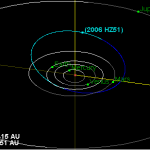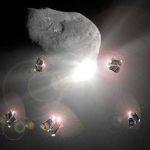Asteroid Set to Shave Earth
Three nights of skywatching by an Australian astronomer have confirmed predictions that an asteroid almost half a kilometre wide will miss the Earth on Monday by 430,000 kilometres.
However, it would still be “one of the largest objects to be observed to pass this close to the Earth,” said Rob McNaught, an astronomer at Siding Spring, near Coonabarabran.
If the predictions had been wrong, and the asteroid, dubbed 2004 XP14, hit the Earth, “you would be talking about very serious consequences,” he said. The astronomer and his colleague, Gordon Garradd, run the Southern Hemisphere’s only search for asteroids that pose a threat to life on Earth.
Funded by NASA, and involving the University of Arizona and the Australian National University, the study uses a telescope that snaps four pictures of the same area of the sky every hour. A computer then sifts through the images looking for objects that have changed position.
Mr. McNaught spent Monday, Tuesday, and Wednesday nights tracking XP14, confirming the asteroid, discovered in 2004, had no chance of sparking a bad day for Earth any time this century.
American radio astronomers will use Mr. McNaught’s observations to refine their plans to bounce radar signals off the asteroid next week to determine its exact size and composition. So little is known of the tiny world that astronomers estimate it is probably about 400 metres wide, but could be twice that size.
The astronomer at Sydney Observatory, Nick Lomb, said XP14 would make its closest approach at 2 pm on Monday.
Dr. Lomb said that if the asteroid struck “it could cause major damage over a whole continent.”
The search by Mr. McNaught and Mr. Garradd had discovered at least 113 asteroids and more than 20 comets, but none that posed a threat to Earth.
A 9½ Hour Reprieve …
A missile with the devastating power of more than 10,000 nuclear bombs detonating simultaneously missed us by mere hours on Monday, July 3, 2006—and yet it barely made the headlines.
In less time than it takes paint to dry, a catastrophe the likes of which mankind has never seen whisked passed our planet receiving comparatively little attention as to what would have happened had it not missed. If this sounds alarmist then consider the following facts.
A large asteroid with the innocuous dub of 2004 XP14 missed Earth by 430,000 kilometres, scientists reported. That may not sound close to most of us, but consider that this giant meteor is traveling at 12.6 kilometres a second (or to put that in more concrete terms, from New York to London in just 7.3 minutes), which translates into an impact time, were it on course, of only 9.5 hours.
If you consider, too, that a meteor just 60 meters wide would cause an explosion equivalent to 1,000 times that of the Hiroshima atomic bomb, then the XP14, estimated to be up to 800 meters across, would cause exponentially greater damage—in short, it would devastate an entire continent and wreak global havoc.
Some will argue that because of the three-dimensional nature of space, opposing velocities, contradictory orbits, and such, it is overreacting to assert that we came within single-digit hours of colliding with an asteroid that would change they way we all live, possibly forever.
Sure, in three dimensions, the odds of a collision lessen, but this doesn’t change the simple fact that had we been on converging paths, Monday, July 3, would have been the blackest day in our history. It’s purely a matter of twiddling with mathematical equations, adjusting angles—splitting celestial hairs.
The point is simple, we have all had yet another cosmic brush with death—another very definite warning—and one day it won’t be hours or even minutes away!
An update of the 2004 XP14 in science speak … still scary stuff:
Asteroid diameter = 900 m Volume (4/3 p r3) = 381,703,507.4 m3 Density (rock) = 3000 Kg / m3 Asteroid mass = 1.145 x 1012 kg Impact v = 17000 m/s KE (½ m v2) = 1.65 x 1020 J (1.65 x 1020 J = 3.95 x 104 megatons TNT)




